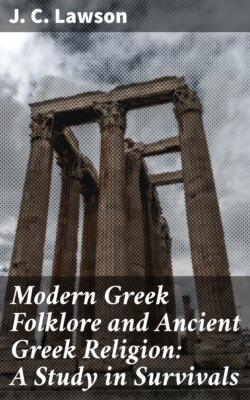Modern Greek Folklore and Ancient Greek Religion: A Study in Survivals

Реклама. ООО «ЛитРес», ИНН: 7719571260.
Оглавление
J. C. Lawson. Modern Greek Folklore and Ancient Greek Religion: A Study in Survivals
Modern Greek Folklore and Ancient Greek Religion: A Study in Survivals
Table of Contents
PREFACE
CHAPTER I. INTRODUCTORY
§ 1. Modern Folklore as a source for the study of Ancient Religion
§ 2. The survival of Ancient Tradition
§ 3. The survival of Hellenic Tradition
§ 4. The Survival of Pagan Tradition
CHAPTER II. THE SURVIVAL OF PAGAN DEITIES
§ 1. The Range of Modern Polytheism
§ 2. Zeus
§ 3. Poseidon
§ 4. Pan
§ 5. Demeter and Persephone
§ 6. Charon
§ 7. Aphrodite and Eros
§ 8. The Fates
§ 9. The Nymphs
§ 10. The Queens of the Nymphs
§ 11. Lamiae, Gelloudes, and Striges
Gelloudes
Striges
§ 12. Gorgons
§ 13. The Centaurs
§ 14. Genii
CHAPTER III. THE COMMUNION OF GODS AND MEN
CHAPTER IV. THE RELATION OF SOUL AND BODY
§ 1. The Modern Greek Vampire
§ 2. The Composition of the Superstition. Slavonic, Ecclesiastical, and Hellenic Contributions
§ 3. Revenants in ancient Greece
§ 4. Revenants as Avengers of Blood
CHAPTER V. CREMATION AND INHUMATION
CHAPTER VI. THE BENEFIT OF DISSOLUTION
CHAPTER VII. THE UNION OF GODS AND MEN
GENERAL INDEX
INDEX OF GREEK WORDS AND PHRASES
Footnote
Отрывок из книги
J. C. Lawson
Published by Good Press, 2021
.....
and so forth in such simple strain[34]. At each doorway and more particularly at every spring and well, which it is the special duty of the Perpería to visit, anyone who will may empty a vessel of water over the boy, to whom some compensation for his drenching is usually made in the form of sweetmeats or coppers.
The word περπερία has been the subject of considerable discussion. By-forms περπερίτσα, περπεροῦνα, and παππαροῦνα also occur. The first two are of the nature of diminutives; the last-named is a corrupt form used only, so far as I know, in one district of Epirus, and means a ‘garden-poppy.’ The perversion of the word has in this district (Zagorion) affected the rite itself; for it is considered necessary for this flower to be used largely in dressing up the chief actor in the ceremony[35]. But the most general, and, as I think, most correct form is περπερία (or περπερεία). With the ancient word περπερεία, derived from the Latin perperus and used in the sense of ‘boasting’ or ‘ostentation,’ it can, I feel, have no connexion; and I suggest that it stands for περιπορεία, with the same abbreviation as in περπατῶ for περιπατῶ, ‘walk,’ and subsequent assimilation of the first two syllables. If my conjecture is right, the word originally meant nothing more than a ‘procession round’ the village; next it became confined in usage to a procession for the particular purpose of procuring rain; and finally, the words πορεία[36] and πορεύομαι having been lost from popular speech, it was taken to be the name of the boy who plays the uncomfortable part of vegetation craving water. And indeed it would seem likely that the song which forms part of the ceremony was actually first composed at a time when περπερία was still understood in the sense of ‘procession’: for in every recorded version known to me it would be still possible to interpret the word in this meaning without detriment to the context.
.....